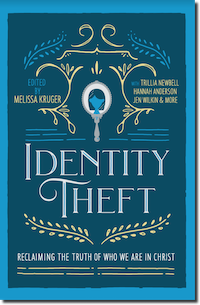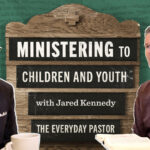Let’s face it: the word “gospel” gets thrown around somewhat loosely in Christian conversation today—so much so that its weighty meaning can get lost, or at least muffled. To grasp the good news of the gospel, then, we must first internalize the significance of that word “news.” It is, after all, what separates Christianity from every other religion.
Christianity is not, fundamentally, good advice. It is an announcement of good news.
You don’t need to go to seminary to grasp the gospel. You don’t need to be in ministry to grasp the gospel. You don’t even need to have been a Christian for five minutes in order to grasp the gospel well enough to convey it to others.
All you need to understand is that 2,000 years ago, an invasion took place. Heaven came to earth in the person of Jesus, and he inaugurated a new kingdom. For 33 years, he lived a life of unflinching, perfect faithfulness to God the Father. He lived the life that, try as we might, we cannot live. And because he loves us, he died the death we deserved to die. As a believer in Jesus, I can know that on the cross he was treated as if he’d lived my sinful life, so that I might be treated as if I’ve lived his righteous life.
2,000 years ago, an invasion took place.
And then Jesus was buried. Until he wasn’t—because three days later, he got up and walked out of his tomb. Now everyone who turns from their rebellion—whether of the plainly wicked or subtly “religious” variety—and trusts in Jesus is united to him in this life and the next. Believers will one day be resurrected in new bodies fit for a new, resurrected earth. We’ll enter into the joy of our triune Lord—Father, Son, and Holy Spirit—and will rule under him as kings and queens of the universe forever.
In a skeptical age, this may sound far-fetched, like a fairy tale for gullible kids. Too good to be true. But this news is entirely true. It just isn’t deserved—indeed, it isn’t fair. As one song phrases it, “Why should I gain from his reward? I cannot give an answer.”
But mercy is never fair. That’s why it’s called mercy.
One Gospel, Two Angles
I’m a pastor in Richmond, Virginia, and there are things about my city—size, layout, population density, and so on—that I can best learn from the vantage point of an airplane. There are plenty of other things I can better learn by walking down Broad Street. Both perspectives are helpful, even necessary, for understanding Richmond. A street-level view without an aerial perspective to frame it, or an aerial view without a street-level perspective to fill it out, will inevitably yield a truncated frame of reference. Sure, we’re just talking geography—Richmond’s history and culture, for example, must be learned by other means—but a failure to see the city from various angles creates a one-dimensional, distorted outlook.
Likewise, as Matt Chandler has pointed out, the gospel can be profitably observed from two biblical vantage points: “in the air” and “on the ground.” Just as there aren’t two capital cities in Virginia, so there aren’t two gospels. There’s one that we can marvel at from two angles.
There’s one gospel that we can marvel at from two angles.
The gospel “in the air” is the sweeping story, from Genesis to Revelation, that can be summarized in a few plot points (for example, creation, fall, redemption, and new creation). The gospel “on the ground,” meanwhile, fleshes out how this epic narrative becomes good news for sinners like us (for example, by looking at God, humanity, Christ, and our response).
At the outset of this article, I offered a brief summary of the gospel story. But we can fill it out even more. Perhaps one way to synthesize the best of these complementary perspectives—“in the air” and “on the ground,” “wide lens” and “zoom lens”—is to consider the gospel story in four movements: the Ruler, the Revolt, the Rescue, and the Response. I hope this deeper dive will provide a rich context from which to share your faith.
The Ruler
“In the beginning, God . . .” (Gen. 1:1). The Bible opens with history’s most basic statement about reality.
God created, sustains, and rules everything that exists. Contrary to cultural misconceptions, he’s not Santa in the sky, nor a cosmic vending machine, nor an irritable drill sergeant, nor a deadbeat dad. He is the King of glory and the Lord of love. He’s an eternal community of persons, a Father loving his Son in the joy of the Holy Spirit. And because this loving and joyful God is Trinity—one God forever existing in three persons—love is at the heart of the universe.
This triune God made humanity—you and me—in his image to know and enjoy his love. We were made by God (which means he alone owns us) and for God (which means he alone satisfies us). Human beings were custom-designed to find meaning and fulfillment and life in our Creator above all else—above success, above popularity, above recreation, above romance, above self.
Is that the story of your life—being totally satisfied in your Maker and treasuring him above everything? It certainly isn’t the story of mine.
What happened?
The Revolt
We look for love in all the wrong places because something has gone terribly wrong in our hearts. This echoes what happened when our first parents, Adam and Eve, turned their backs on God and chose to call the shots themselves, fracturing his creation and plunging his image-bearers into an ocean of sin. Instead of living for our Maker, we live for ourselves. The tentacles of sin have deformed our hearts and disordered our loves. Every one of us has rebelled, by both nature and choice, against the Lord of love.
The tentacles of sin have deformed our hearts and disordered our loves.
It’s easy to think of sin as a relatively minor thing—outward naughtiness perhaps, or a kind of heavenly parking ticket. But when the Bible talks about sin, it’s talking about “cosmic treason”—an insurrection against heaven itself.
It’s vital we grasp two truths about the nature of sin.
1. Sin is more relational than behavioral.
When Adam and Eve rebelled against God, it wasn’t just a behavioral boo-boo; it was a heart-level betrayal. We’ve cheated on our Maker, which is why Israel’s sin in the Old Testament is so often cast in terms of spiritual adultery. We’ve desperately sought to build our lives around other things—anything but him. We’ve taken good gifts and turned them into stand-ins for the Giver.
2. Sin is more vertical than horizontal.
Though its horizontal effects are devastating, sin is fundamentally a vertical problem. David, the “man after [God’s] own heart” (1 Sam. 13:14) confesses well the predicament of us all: “For I know my transgressions, and my sin is ever before me. Against you, you only, have I sinned and done what is evil in your sight” (Ps. 51:3–4; cf. Gen. 39:9; Luke 15:21).
Here’s something fascinating: “sin” is the only noun in the English language that’s larger in its singular form. “Sin” is a bigger category than “sins.” At the deepest level, then, it’s rightly said that we aren’t sinners because we sin—we sin because we’re sinners.
But it gets worse. Ponder this: the result of our me-ism and idolatry is nothing less than a catastrophic chasm between us and God. “Your iniquities have made a separation between you and your God,” the prophet Isaiah declares, “and your sins have hidden his face from you so that he does not hear” (Isa. 59:2). We’ve bucked God’s design for us, his image-bearers, and so we’re severed from the ultimate Source of life and love. And when we die, it’s time for justice: “It is appointed for man to die once, and after that comes judgment” (Heb. 9:27).
As a result of our sin, we’re justly under God’s wrath—his holy and settled opposition to evil. “If God is for us, who can be against us?” Paul asks believers (Rom. 8:31). But the reverse, for those outside of Christ, is also true: If God is against you, who can be for you?
In grasping the gospel, then, how good do you have to be to enter heaven? Here’s the staggering answer: as good as God. Only persons whom God considers perfect can live with him forever.
This need for moral perfection, of course, is everlastingly bad news. Left to our own merit, we’re standing on the precipice of a hopeless future in hell—not just God’s absence, but the presence of his right and good justice.
Here’s how Paul explains it to the Ephesians:
You were dead in the trespasses and sins in which you once walked, following the course of this world, following the prince of the power of the air, the spirit that is now at work in the sons of disobedience—among whom we all once lived in the passions of our flesh, carrying out the desires of the body and the mind, and were by nature children of wrath, like the rest of mankind. (Eph. 2:1–3)
Instead of the credits rolling, though, Paul continues: “But . . .”
Have you ever thought about the fact that your entire eternity hangs on this one little word?
The Rescue
Something happened in history to change the trajectory for those who rely on Jesus for salvation, and here’s the decisive “but”: “But God, being rich in mercy, because of the great love with which he loved us, even when we were dead in our trespasses, made us alive together with Christ—by grace you have been saved” (Eph. 2:4–5).
After centuries of rebellion by God’s people, God’s Son—the second person of the eternal Trinity—became an embryo, a baby, a teenager, a man. We couldn’t get to God, so God came to us (Heb. 2:14–15). For 33 years, the carpenter from Nazareth lived a life of uninterrupted devotion and obedience to his heavenly Father. He prayed a lot of prayers but never once a prayer of confession, because he never had any sin to confess.
Jesus lived the life of moral perfection that Adam failed to live, that Israel failed to live, and that you and I have failed to live.
Israel’s long-awaited Messiah became “obedient to the point of death, even death on a cross” (Phil. 2:8). The One who made the law kept it and then died for those who had broken it. The law-maker became the law-keeper and died in the place of law-breakers.
We’ve now reached the white-hot center of the Christian faith: the death of Jesus Christ. On the cross, God punished his Son, who is perfect, for the sins of those who are not.
On the cross, God punished his Son, who is perfect, for the sins of those who are not.
But that’s not the only thing that occurred. If all God did was cancel our sin, that would have simply brought us back to zero.
Think about it this way: there are 82 games in an NBA regular season. No team has ever achieved a perfect season—one without any losses. “But wait,” some fan might object. “My team’s record is currently 0–0. That’s a perfect season—we haven’t lost any games!”
We’d rightly roll our eyes. “Your” team hasn’t lost because they haven’t played all their games. To have a perfect season you must never lose and always win—right through to the very last game.
In the garden of Eden, Adam and Eve had a moral record, as it were, of 0–0. They hadn’t sinned, so they were “undefeated.” But neither had they achieved a lifetime of righteousness, so it wasn’t a “perfect season.” And when they turned from God, they became spiritually bankrupt. They plummeted to 0–82, the moral record we now inherit.
However, in the middle of history, one man amassed an unprecedented record: 82–0.
Continuing the illustration, here’s the point: if Jesus only paid for our sins, our moral record would be 0–0. But on the cross, Jesus didn’t just absorb our 82 losses; he also gave believers his 82 victories, certified by his empty tomb (Rom. 4:23–25). So our record shifts, in an instant, from 0–82 to 82–0. In the eyes of a holy God, it’s now as if we’ve done nothing to offend him and everything to please him.
Paul puts it like this, referring to Christ: “[God] made him to be sin who knew no sin, so that in him we might become the righteousness of God” (2 Cor. 5:21). On the cross, God treated Christ as if he had lived a believer’s sinful life so he could treat us as if we’d lived Christ’s spotless life. No wonder theologians call this “the sweet exchange.”
What does this mean practically as we grasp the gospel for ourselves and others? Well, in the words of the Puritan Richard Sibbes, “There is more mercy in Christ than sin in us.” No matter who you are or what you’ve done, hear the magnificent news: there is more mercy in Jesus than sin in you.
No matter who you are or what you’ve done, hear the magnificent news: there is more mercy in Jesus than sin in you.
In our cultural moment, it’s vital to grasp that Jesus didn’t die merely to boost our self-esteem or to set a moral example. Such a perspective, however well-meaning, domesticates what he did. He stooped to take our place on the cross because we scramble to take his place on the throne. I love the way John Stott explains it:
The concept of substitution may be said to lie at the heart of both sin and salvation. For the essence of sin is man substituting himself for God, while the essence of salvation is God substituting himself for man. Man asserts himself against God and puts himself where only God deserves to be; God sacrifices himself for man and puts himself where only man deserves to be. Man claims prerogatives that belong to God alone; God accepts penalties that belong to man alone.
Amen. And yet we must be careful, when presenting the gospel, not to leave Jesus hanging on the cross.
After his death, his brutalized corpse was placed in a “secure” tomb (Matt. 27:65–66), never to be heard from again. Except, he was heard from again—because the power of death could not suppress the Author of life (Acts 2:24; cf. 3:15). And so, as he’d promised, on the third day he exited the tomb.
As we prepare to share our faith, the resurrection isn’t an “add-on” to the gospel story—because without it, there’s no gospel story. In raising Jesus from the dead, God was publicly affirming that his sacrifice on the cross had been accepted, a just and complete payment for sin. If on Good Friday redemption’s check was signed, on Easter Sunday the check cleared.
If on Good Friday redemption’s check was signed, on Easter Sunday the check cleared.
And one day, this same Jesus—who died and rose and ascended to heaven and intercedes for his people—is going to make a comeback. Those who haven’t trusted him will receive justice; those who have will receive mercy. Our ultimate hope as Christians isn’t evacuation from this earth but the restoration of this earth. God’s redeemed people will inherit a remade world, unmarred by the scourge of sin. This is why the Scriptures portray our future home in concrete, material terms—“new heavens and a new earth” (Isa. 65:17; cf. 2 Pet. 3:13; Rev. 21:1–4). Contrary to popular belief, we won’t be floating around playing golden harps with chubby angels. We’ll be running and working and playing and singing and laughing and resting and reveling in the endless wonders of our good and beautiful God.
Your Response
When you pass through a highway toll and interact with the person in the booth, is it a meaningful experience? Not exactly. It’s a business transaction: you pay the money; he raises the bar. You do your part; he does his.
Becoming a Christian, friend, is not like this. It’s not a cold transaction. It’s more like getting married—an intensely personal union. You throw yourself on Jesus for mercy; he catches you and never lets go.
So, as we grasp this gospel we long to impart to others, we can be ready to answer the most important question one could ask: What must I do to be right with God?
1. Turn
First, we turn from sin. We’re skilled at confessing the evil of others, but we should be most devastated by our own. This is the meaning of repentance—changing your mind and doing an about-face, a 180-degree pivot from living for yourself.
2. Trust
Second, we trust Jesus Christ. We say “no” to sin and “yes” to him, embracing what he has accomplished for us and his invincible promise to forgive. Repentance and faith, after all, are two sides of the same coin.
3. Treasure
We also treasure Jesus. Technically, this isn’t a third step—it’s the outcome of the second. But it’s worth spelling out because many “accept” Christ the way one accepts, say, a root canal. Grasping the gospel, though, entails embracing Jesus as Lord and Savior and Treasure.
What this means, among other things, is that Jesus Christ is infinitely more than a get-out-of-hell-free pass. He’s a living person to follow, worship, cherish, and enjoy. Knowing him is the only way to be restored to a right relationship with the God for whom we were made (John 14:6; 17:3). Through him we can experience the joy of forgiveness, the help of the Holy Spirit, and the hope of the world to come.
No person is saved by getting baptized, going to church, reposting Christian sentiments, praying a prayer, signing a card, walking an aisle, or throwing a pinecone into the fire at summer camp. The critical question facing each of us blows right past everything outward, for it’s laser-aimed at the heart: Are you, right now, relying on Jesus alone for your standing before God?
The gospel demands a response. “Now is the day of salvation,” Paul insists (2 Cor. 6:2). In sharing our faith, let’s urge people to respond to the claims of Christ, bringing them to that eternally momentous point of decision.
This is the greatest story ever told—and anybody can get in on it.
This article is adapted from Matt Smethurst’s book Before You Share Your Faith: Five Ways to Be Evangelism Ready (10Publishing, 2022).
Get Your FREE eBook: ‘Identity Theft’, edited by Melissa Kruger

Do you ever wrestle with the gap between what you believe and how you live? Do you feel discouraged when comparing your faith to others? Do you struggle to believe God would really love fickle-hearted people?
We all do, which is why TGC wants to send you a FREE digital copy of Identity Theft: Reclaiming the Truth of Who We Are in Christ.
Ready to be encouraged? Tell us where to send your copy of Identity Theft using the link below.


































